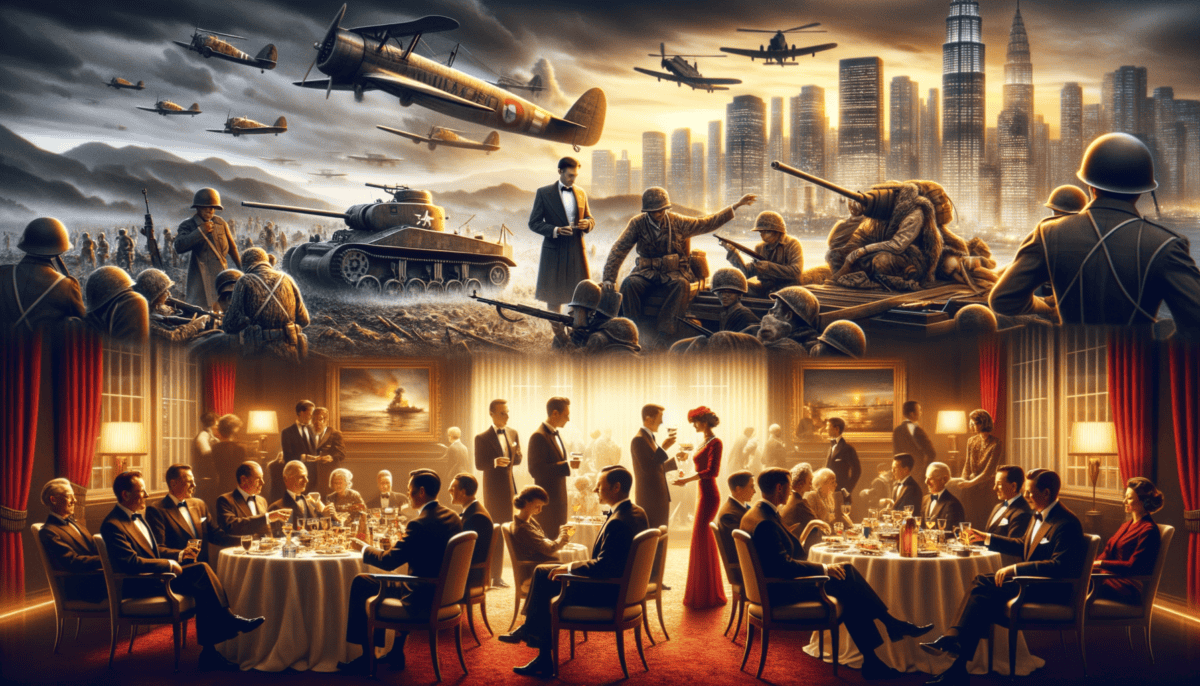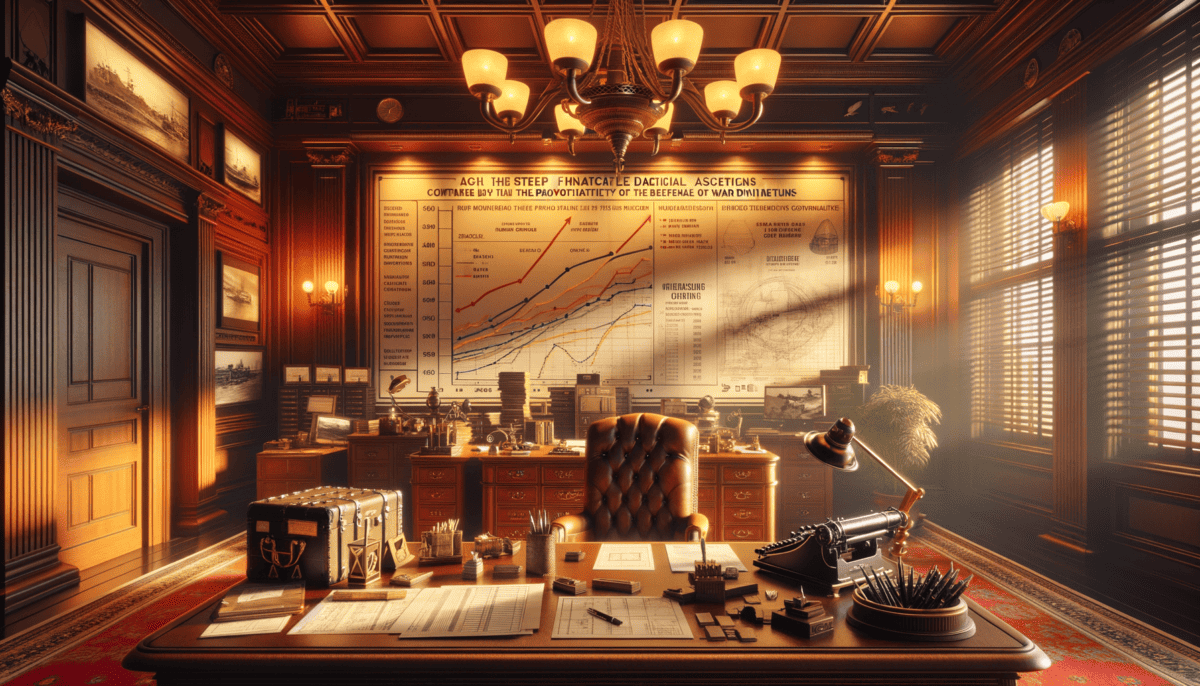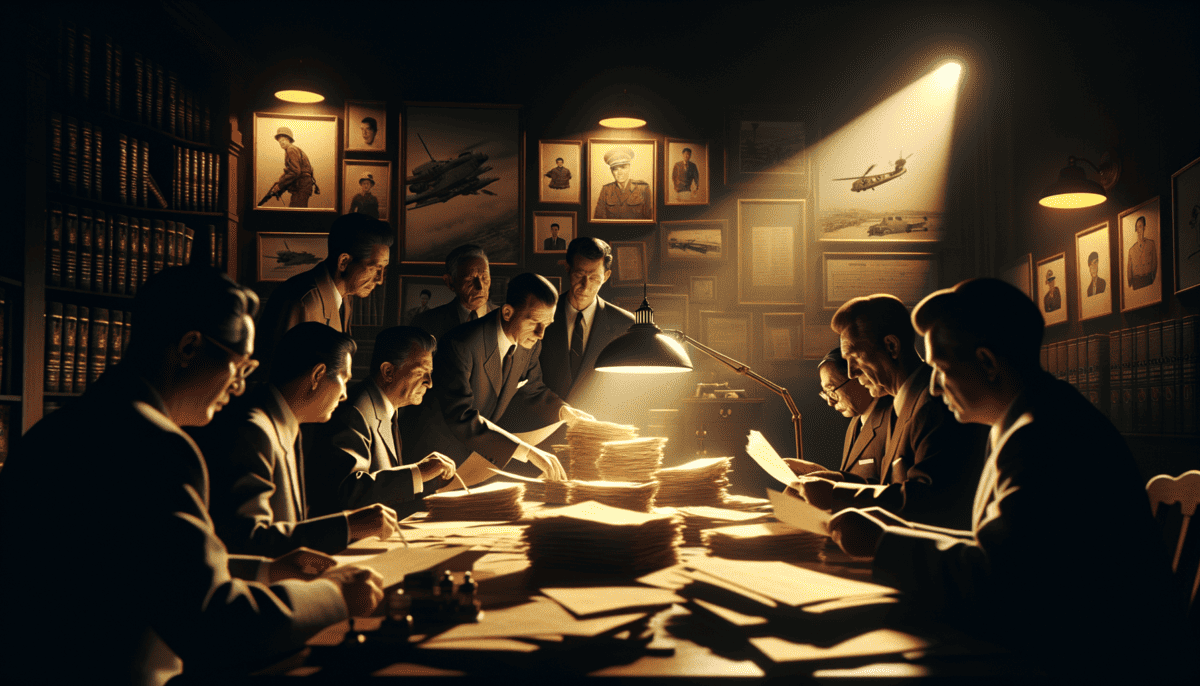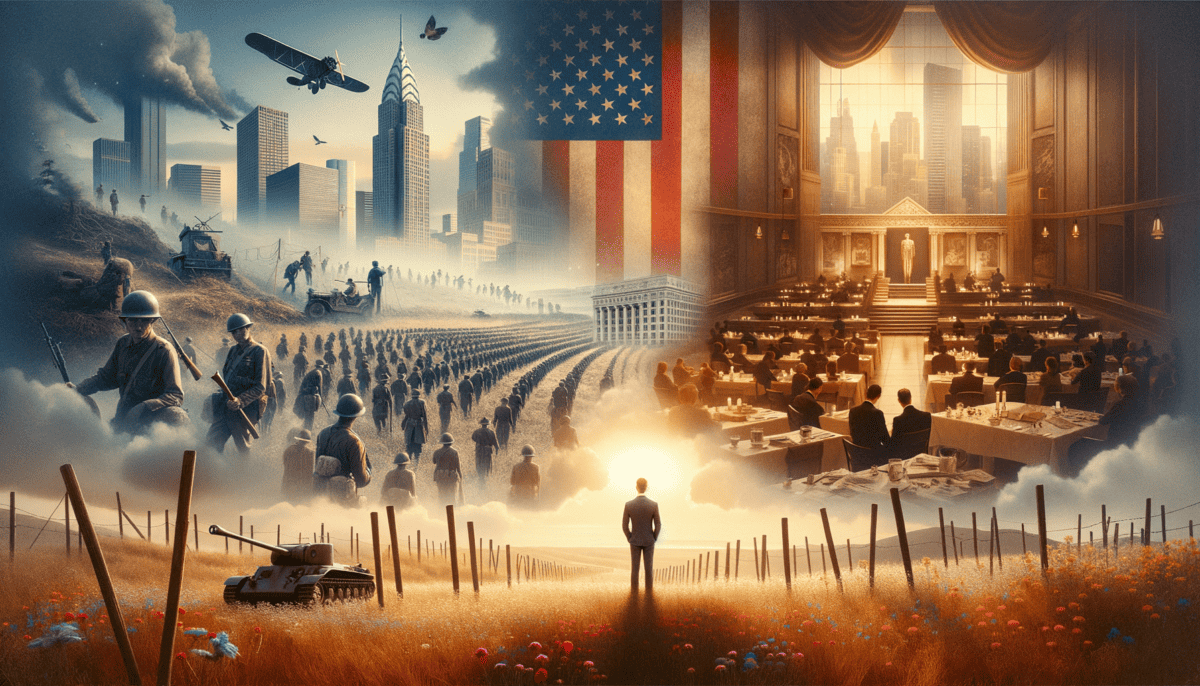The Gathering Storm
The summer of 1950 was hot and tense in Washington D.C. Men in dark suits rushed through the halls of Congress. They knew something big was coming. War was in the air.
Senator John Williams sat at his desk, frowning at the paper in front of him. His aide, Tom Peters, stood nervously nearby.
“Look at these numbers, Tom. Defense companies are already making moves. They know war is coming to Korea.”
Big companies like Boeing and General Motors were getting ready. They wanted to make weapons and vehicles for the military. These companies had friends in the government who could help them get special deals.
James Harrison, the CEO of Harrison Defense Systems, smiled as he looked out his office window. His company was small now, but he had big plans.
“This is our chance,” he told his board members. “The military will need everything we can make. And fast.”
A Rush for Riches
As summer turned to fall, more companies joined the rush. They hired people who used to work in the government. These people knew how to get military contracts. They knew who to talk to and what to say.
Sarah Chen, a young reporter for the Washington Post, watched it all happen. She wrote in her notebook:
The signs were everywhere:
• Companies buying more factories
• Secret meetings with government officials
• Stock prices going up fast
• New defense companies appearing overnight
• Old factories changing to make weapons
The Money Game Begins
By December 1950, the game was in full swing. Companies fought to get the biggest contracts. Some promised they could make things faster. Others said they could do it cheaper.
Senator Williams called another meeting. His office was full of papers showing how much money companies were making.
“This isn’t right,” he told Tom. “These companies aren’t just making money. They’re making way too much money. And the war has barely started.”
Back at Harrison Defense Systems, James got the news he wanted. His company won its first big contract. It was worth more money than his company had made in the last five years.
Sarah Chen kept watching and writing. She saw how the rich were getting richer. She saw how some people in the government helped their friends get contracts.
The war in Korea was about to begin. But another kind of war was already happening in America. It was a war for money. And some people would do anything to win it.
Tom looked at all the papers on Senator Williams’ desk. He thought about all the soldiers who would soon go to Korea.
“Sir,” he said quietly, “do you think anyone cares that they’re making money from a war?”
The Senator just shook his head. The gathering storm was about to become a flood of money. And it would change America forever.
Contracts and Connections
The phone rang in James Harrison’s office. It was January 1951, and the Korean War was in full swing. His old friend from college, now a Pentagon official, was on the line.
“James, we need tanks. Lots of them. Can Harrison Defense handle it?”
James smiled. This was the big break he’d been waiting for. His company had never made tanks before. But that didn’t matter. He knew the right people.
The Friendship Game
Sarah Chen watched as men in expensive suits walked in and out of government buildings. She wrote down their names in her little red notebook:
The pattern was clear. People who used to work for the government were now helping companies get contracts. They knew all the secrets:
• Which offices to visit
• When contracts would be available
• How much money to ask for
• What promises to make
• Who made the big decisions
Easy Money
Tom Peters brought more papers to Senator Williams. The numbers were shocking.
“Look at this, Senator! Harrison Defense got a $50 million contract. Last year, they only made $1 million. How did they grow so fast?”
The answer was simple: friends in high places. James Harrison had played golf with generals. He went to parties with government workers. He hired their relatives.
The Secret Meetings
One rainy night, Sarah followed a group of businessmen to a fancy restaurant. Through the window, she saw them laughing and shaking hands with government officials.
“It’s like a club,” she told her editor. “They decide who gets the money before any papers are signed.”
James Harrison was at that dinner too. He raised his glass and made a toast:
“To our partnerships! May they be as profitable as they are patriotic!”
The Paper Trail
Senator Williams started connecting the dots. He drew lines between companies and their friends in government:
– General Smith → Now works for Tank Corp
– Admiral Jones → Advisor to Ship Builders Inc
– Colonel Brown → Vice President at Harrison Defense
Tom looked at the map and shook his head. “Every person who leaves the government gets a big job at these companies.”
The Money Flows
By spring 1951, the system was working perfectly – for the companies. James Harrison bought a new mansion. His friend at the Pentagon got a promise of a high-paying job after retirement.
Sarah Chen kept writing stories, but few people seemed to care. The money was too big, the connections too strong.
“As long as the tanks get built,” one official told her, “nobody asks questions about who’s getting rich.”
But Senator Williams wasn’t done asking questions. He had a feeling the worst was yet to come. And he was right.
The Money Machine
The numbers made Senator Williams’s head spin. He stared at the report on his desk, his hands shaking.
“One million dollars for toilets? Ten thousand dollars for a single hammer? This can’t be right!”
But it was. The money machine was running at full speed, and nobody could stop it.
The Big Numbers Game
• $500 for a $5 wrench
• $1,000 for a $20 coffee maker
• $5,000 for a $100 radio
• $10,000 for a $200 desk
• $100,000 for a $2,000 truck
Sarah Chen walked into Harrison Defense’s new building. The floors were marble. The chairs were gold. Even the trash cans looked expensive.
“Nice building,” she said to the guard. “How much did it cost?”
“Don’t know,” he smiled. “But the government’s paying for it.”
The Price Tags
James Harrison sat in his new office, looking at his profit charts. Every line went up, up, up!
1951 profits: $20 million
1952 profits: $50 million”
His secretary brought in more good news. “Sir, the government approved our new prices. They didn’t even ask questions!”
The Truth Comes Out
Tom Peters found a worker who wanted to talk. The man worked at Harrison Defense’s factory.
“We buy parts for $10,” the worker whispered. “Then we tell the government they cost $1,000. Nobody checks. Nobody cares.”
The Big Five
Five companies got the biggest contracts. They made the most money:
2. Tank Corp: $1.5 billion
3. Ship Builders Inc: $1.2 billion
4. Air Force Partners: $900 million
5. Military Supply Co: $800 million
The Money Trail
Sarah followed the money. She found amazing things:
Companies bought fancy houses. They had big parties. They gave their bosses huge bonuses. All with government money.
“The war is like a golden ticket,” one business owner told her. “We just have to ask, and the money comes.”
The Hidden Costs
But not everyone was getting rich. Tom talked to soldiers in Korea.
“Our tanks break down,” one soldier said. “The parts are cheap. But the government paid top dollar for them.”
The Machine Keeps Running
James Harrison bought another mansion. His company got bigger contracts. The money kept flowing.
Senator Williams looked at more reports. The numbers got bigger every day. Something had to break.
Sarah Chen kept writing stories. Tom Peters kept digging. They knew the truth was bigger than anyone imagined.
And then, someone inside Harrison Defense decided to talk. They had proof of something much worse than high prices…
Shadows of Corruption
Mary Jenkins couldn’t sleep. The papers in her desk at Harrison Defense told a scary story.
“If I show these papers, I might lose my job. But if I don’t, more soldiers could get hurt.”
A Brave Voice
Mary walked into Tom Peters’ office early one morning. Her hands shook as she put a big folder on his desk.
“Look at this,” she whispered. “Harrison Defense is selling broken parts to the army. They know they’re broken.”
The Bad Parts List
Tom looked at Mary’s papers. They showed:
• Radio sets that stop working when wet
• Truck engines that break after 100 miles
• Guns that jam in the dirt
• Medicine that doesn’t work
Congress Gets Mad
Senator Williams banged his fist on the table.
“These companies are not just taking too much money,” he said. “They’re putting our soldiers in danger!”
More People Speak Up
After Mary told her story, other workers started talking too:
“They said to ship them anyway.”
“Nobody checked if things worked.”
“It was all about making money fast.”
The Big Investigation
Sarah Chen watched as FBI agents walked into Harrison Defense. They carried boxes and boxes of papers out.
“We’re looking at every contract,” an agent told her. “Every dollar. Every broken part.”
James Harrison’s Bad Day
James Harrison had to go to Congress. He didn’t smile anymore.
“Did you know the parts were broken?” Senator Williams asked.
“I… I…” Harrison couldn’t answer.
The Real Cost
• 500 broken tanks
• 1,000 bad radios
• 2,000 soldiers with bad equipment
• $500 million wasted
Heroes Step Forward
More workers like Mary told their stories. They were brave. They lost their jobs. But they helped stop bad things from happening.
Changes Begin
The government made new rules:
• Companies had to prove things worked
• Prices had to be fair
• Bad companies couldn’t get new jobs
The Fight Goes On
Tom and Sarah kept working. They knew there were more secrets to find.
Mary started a group to help other workers tell the truth.
Senator Williams promised to make bigger changes. But some companies were already finding new ways to cheat…
The Big Picture Comes Clear
Sarah Chen sat in a quiet library, spreading old papers across a big table. The pieces were starting to fit together like a puzzle.
Following the Money Path
Tom Peters drew a simple map on his whiteboard. Lines connected companies, politicians, and army leaders.
“Look here,” he said to Sarah. “Every time there’s a war, the same people get rich.”
The Hidden Pattern
They found something scary:
• Politicians helped companies get contracts
• Army leaders got jobs at these companies later
• Everyone made lots of money – except soldiers
Mary’s New Friends
Mary Jenkins started getting phone calls from workers at other companies. They all had similar stories:
“We charge $100 for parts worth $10.”
“They tell us to keep quiet about problems.”
The Money Machine
Sarah made a simple chart showing how much money companies made during the war:
| Company | Money Before War | Money During War |
| Harrison Defense | $1 million | $50 million |
| Big Tank Corp | $2 million | $75 million |
| Mega Arms Inc | $3 million | $100 million |
People Get Angry
When regular people learned about this, they got mad.
“My son is fighting with broken equipment while these guys get rich?” one mom cried at a town meeting.
Changes Start Happening
Good things began to happen:
• New laws made companies prove their prices were fair
• Politicians couldn’t take money from war companies
• Army leaders had to wait before working for companies
The Truth Spreads
Fighting Back
The big companies tried to stop the changes:
“You’re hurting business!”
“This is how things have always worked!”
A New Way Forward
Senator Williams stood up in Congress with a new plan:
“We can have strong defense companies AND be honest. We can protect our soldiers AND spend money wisely.”
Hope Grows
More people joined Mary’s group. They worked to:
• Help workers tell the truth
• Watch companies closely
• Make sure soldiers got good equipment
The Work Continues
Sarah looked at her growing pile of evidence. Tom kept drawing his maps. Mary answered more calls.
They knew the system wouldn’t change in one day. But now everyone could see what was wrong. And that was the first step to making things better.
The big question remained: Would these lessons stick? Or would people forget when the next war came?
Making Things Right
The sun rose over Washington D.C. as Sarah Chen walked into a big meeting room. Today was different. Today, they would share everything they found.
Telling Everyone
Tom Peters stood up first. His voice was strong and clear:
“During the Korean War, some companies took way too much money. They charged $1,000 for things that cost $100. That wasn’t right.”
The Real Heroes
Mary Jenkins brought forward workers who told the truth:
“They told us to use cheap parts but charge for good ones.”
“Some soldiers got hurt because of bad equipment.”
Making New Rules
Senator Williams stood up with a big poster showing new rules:
| Old Way | New Way |
| Secret deals | Open meetings |
| Hidden prices | Fair prices shown to all |
| No checking | Regular checking |
Companies Promise to Change
• Be honest about prices
• Make good equipment
• Help soldiers, not just make money
Looking to the Future
Sarah showed pictures of happy soldiers with good equipment.
“This is what happens when we do things right. Our soldiers stay safe. Our money helps people, not just companies.”
Everyone Learns
Schools started teaching kids about:
• Being honest with money
• Helping others before helping yourself
• Standing up when you see something wrong
Good Changes Last
A Better Way
Tom made one last drawing. It showed how everyone could work together:
The Story Lives On
Years later, people still talked about what happened. They remembered:
• How working together fixed big problems
• How doing what’s right is always important
The Best Lesson
Sarah wrote in her final report:
“Money is important. But doing the right thing is more important. When we help each other, everyone wins.” ⭐
And that’s how the story of the Korean War made America better. People learned that being honest and helping others matters more than getting rich. The lesson still helps us today.






